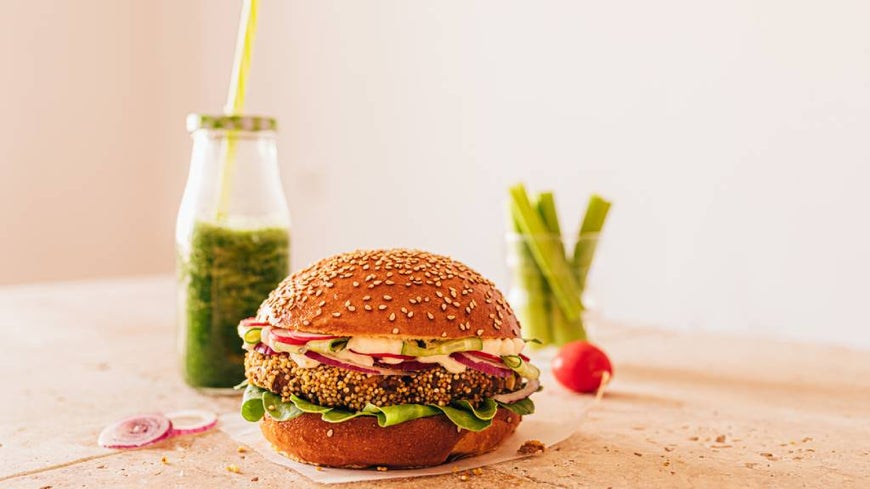Why plant-based foods are taking off

Written by Ellouise Bailey for Australian Seniors.
Gone are the days when the only plant-based alternative to meat at the shops was a boring old salad sandwich. Today, supermarkets are reporting double-digit growth in the sector and there are whole sections dedicated to plant-based sausages, burgers and salami-style sandwich fillings, as well as cheeses derived from plant, rather than dairy, sources.
The rise is fuelled by demand. Australia is the third-fastest-growing vegan market in the world, according to Euromonitor International, with packaged vegan food worth $215 million in 2020. And that’s just the tip of the iceberg. Vegans strictly avoid all animal products, but there’s also increasing interest in plant-based diets, which look to include more fruits, vegetables, legumes, nuts, seeds, and grains on the menu, in favour of animal-based foods.
Even the peak government research body, CSIRO, is in on the act. It’s a partner in the plant-based meat startup v2food – and predicts that alternative proteins, including plant proteins such as soy and pea, could be worth $6.6 billion to Australia in 2030.
But while the benefits of eating fresh fruit and vegetables are well regarded, are processed plant products any good for you? In a recent study, Australia and New Zealand think tank Food Frontier compared processed meats with their plant-based counterparts. Accredited practising dietitian Teri Lichtenstein, who co-authored the report, concludes the plant-based meat alternatives are indeed nutritionally comparable, or superior, to the processed meat equivalents.
The benefits of vegan food

“They’re lower in negative nutrients like saturated fat and sodium which have been linked to heart disease, but are often higher in protein and dietary fibre, which are essential for a healthy diet,” she says.
In 2015, the World Health Organisation classified processed meats including ham, bacon, and salami as carcinogenic, and flagged red meat as a probable cause of cancer. Although Teri believes that meat does have a place as part of a healthy diet, she says: “In Australia, people are eating way above the recommended guidelines.”
However, she warns that processed plant products aren’t necessarily classified as health foods, and are not designed to be eaten every day.
Interestingly, her research finds that while vegetarians (who eat eggs and dairy as well as plants) and vegans are most likely to be Millennials, Baby Boomers had the highest uptake of alternative proteins, most likely due to health concerns about meat. In fact, 43% of Baby Boomers said they identified as ‘meat reducers’.
There are so many options for plant-based meals
Ingrid Thompson, 55, a business consultant from Sydney, remembers when the only option for a vegetarian at a restaurant was veggies without the chicken. Her decision to become a pescatarian (a vegetarian who eats fish and other seafood) almost 30 years ago was an ethical one. Now she loves the variety she gets from cooking meals using alternative meat products.
“The mince is great if you like spaghetti bolognese or shepherd’s pie. When you add mushrooms, onion, vegetables and a sauce, it tastes great,” she says. “There’s also a beetroot burger and a hemp one that tastes better than the meat-style ones to me.”
Ingrid believes these products contribute to her wellbeing. “As I head out of my 50s and into the next decade, I feel healthy and satisfied,” she says.
However, nutritionist and wholefoods advocate Cyndi O’Meara has a different take. “These companies aren’t telling you the complete truth,” she says. “Comparing processed meat instead of real meat [to the meat alternatives] is a game to convince people to eat their products. There are emulsifiers, which are vegetable oils grown from genetically modified crops and chemicals in there. Real, unprocessed meat always comes up better than these products.”
She says there have been no long-term studies on the impacts of these products. “The human body needs animal proteins to be healthy and science can back this up,” she says. “In human history, we only lived on a plant-based diet out of necessity.”
Cyndi and Teri both acknowledge that biotechnology will be integral to the development of new plant-based options. Biotech was famously used in America’s ‘Impossible Burger’, a soy protein patty that ‘bleeds’ like beef due to the addition of a specially bioengineered yeast designed to mimic haem, a molecule found in meat. We may well see healthier formulations of plant-based food ingredients as this industry evolves.
Thinking about your future?
Good health is something to be proud of, and at Australian Seniors, we believe it’s the foundation of a great life. Enjoy the peace of mind that comes with Seniors Health Insurance.
26 Apr 2021